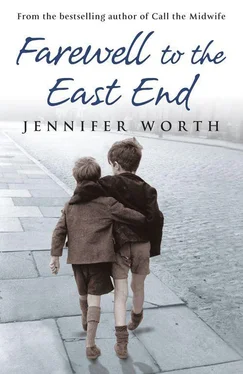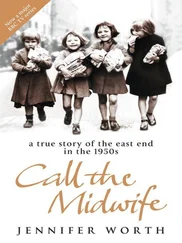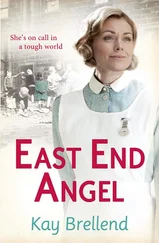‘Stiff upper lip, old girl,’ retorted the colonel. ‘This can’t last for long, and then they’re going to Sierra Leone, I understand.’
‘Thank God for that. Best place for her,’ said Mater emphatically.
Sister Julienne was quietly thrilled at the way Chummy had developed. Many girls had come to Nonnatus House aspiring to be medical missionaries, but somehow Chummy would always stand out in her mind. She gazed at the tall, happy girl standing at the other side of the room and fondly remembered her awkwardness when she first came to the convent, falling over things or walking into stationary objects. Above all she remembered Chummy learning to ride a bike with that nice boy Jack helping her. That was when the girl’s true mettle first became apparent – she was indomitable. Sister Julienne chuckled to herself as she looked across the room at David, the policeman Chummy had somehow managed to run into and almost knock unconscious. So this was how the good Lord had planned it!
Sister Julienne was a deeply romantic soul, and she smiled to herself again as she remembered Jane and the Reverend Thornton Applebee-Thornton. Perhaps God had needed a bit of help there! She had never tried matchmaking before, but when the reverend gentleman had come from his mission in Sierra Leone to study the midwifery practice of the Sisters as a model for the medical services he wanted to introduce into his mission, she had shamelessly thrust Jane into his company. The success of her little plan had been spectacular. And now Chummy was going out to join them in Sierra Leone as the first trained midwife, while David had applied to the police force there.
Sister Julienne smiled around her at the happy faces, at Mrs B, in her element amid all the catering, Fred ambling around, moving chairs, clearing up, and obviously making wisecracks for the benefit of all. She looked across at the nurses from St Tommy’s, who were roaring with laughter at the policemen, and thought how delightful it was to see young people enjoying themselves. And then her gaze fell on the frigid face of Mrs Fortescue-Cholmeley-Browne. This isn’t right, she thought. I must go over and have a word with her.
After the usual pleasantries, Sister Julienne went straight to the point.
‘Mothers and daughters seldom understand each other.’
‘What makes you say a thing like that?’ said Mrs Browne guardedly.
‘Experience.’
‘Experience? You have no children.’
‘No, but I have a family. I am one of a family of nine, and I saw the tension between my mother and her five daughters. None of us lived up to her expectations. She did not attend any of their weddings. Not one! And when I took religious vows, she was outraged. I was embarrassing the family, she said. So you see, I know all about misunderstandings between mothers and daughters.’
Mrs Browne sat silent. She was not going to be drawn. After a moment’s pause, Sister went on.
‘Camilla is a fine young woman. You can be very proud of her. She has the makings of nobility in her. She has strength of character, steadfast pursuit of her goal and above all mental and physical courage. These are the qualities that built the British Empire.’
Sister Julienne had scored a goal. Mrs Fortescue-Cholmeley-Browne came from a colonial family. Her father had been official adviser to the Raj and administrator of Bengal. Her husband, the Governor of Rajastan. She knew all about the qualities that had built the British Empire. After a pause, she said, ‘Well, I wish I could see it.’
‘You will, I assure you. Mothers and daughters always draw closer to each other as the years pass. Camilla and David ...’
Mrs Browne butted in: ‘This David! This fellow she is marrying. A common policeman. I ask you! What sort of marriage is that?’
‘He may be a common policeman, but I have every reason to believe he is a fine young man and will make a good husband. He has a heroic war record. He flew and landed behind the German lines at Arnhem, you know, and not only survived, but helped others to survive.’
‘I didn’t know that.’ The lady’s face softened.
‘No. Probably not. It is not the sort of thing he talks about.’
The time for speeches was drawing near. Sister Julienne felt she had no more than a few minutes alone with the mother of the bride, and must introduce some humour into the situation.
‘Another thing. For years after he was demobbed from the army David’s father (she pointed to Mr Thompson) strongly disapproved of his son. Nothing the boy could do was good enough for Mr T. So you see, the same misunderstandings and tensions can arise between fathers and sons. Often worse. The son does not live up to the father’s expectations and earns his reproaches. And when he does succeed very often masculine rivalry can set in as the father desperately tries to beat his son at the very game he has initiated.’
For the first time that day Mrs Fortescue-Cholmeley-Browne burst out laughing. Chummy, who had been watching her mother apprehensively, looked across the room with amazement.
‘Oh, how true. I know that syndrome all too well. My own husband shows a deadly rivalry with our son over sculling. The boy’s far better than him, but he can’t or won’t see it. He is taking extra training courses and comes back exhausted, hardly able to move a muscle, and needs physiotherapy. He’ll injure his back, or something, before he will admit defeat. I can’t tell you what the atmosphere is like in our house sometimes with these two men competing against each other.’
The two ladies looked at each other, nearly creasing themselves with laughter but suppressing their giggles because the speeches were just about to start. Sister managed to whisper, ‘I know exactly what you mean.’
The wedding speeches were predictable and charming. The colonel spoke with affection of his only daughter and said he was proud of her nursing career. We girls clapped and shouted, ‘Hear, hear!’ The best man said that David was a credit to the force, and Sierra Leone would be lucky to get him, and the policemen stamped and cheered.
The boys from the South Poplar Youth club band arrived and with them came a wedding guest who had been invited to the church, but had not come. We had all wondered why. This was Jack, a local lad of about thirteen who had been instrumental in teaching Chummy to ride a bicycle when she first came to Nonnatus House. He had turned up early and late, guiding her around the roads, helping her to steer and balance, shouting instructions as he ran along beside her until she had mastered the art. Then he had appointed himself to the position of bodyguard to keep away the local kids who teased her. As a ‘thank you’ the Colonel had given the boy a bicycle.
A close bond had developed between Chummy and Jack, and she had been surprised and a little sad that he had not come to her wedding. When he walked in, slightly behind the other boys, she shouted out, ‘Jack! You’ve come – I’m so glad,’ and rushed over to him. In her exuberance she would probably have taken him in her arms, but he quickly backed off with a ‘Steady on, miss, steady on.’ So she shook hands in the manner that boys of that age prefer. It would not do to shame him in front of the other lads.
Mrs B had held back a substantial part of the feast for the boys from the SPY club, knowing that it would be necessary, and while they were all tucking in, Chummy managed a few words with Jack.
‘Well, I wouldn’t miss your weddin’, miss, but I didn’t wanna come wiv all them toffs, like, so I comes wiv the lads, like, an’ I gotta presen’ for yer, miss. I made it in metalwork at school.’
He pulled a brown-paper package from his pocket and thrust it furtively into her hands, making sure that his back was turned to the others so that they couldn’t see. ‘It’s fer you, miss.’
Читать дальше

![Мелисса де ла Круз - Ведьмы Ист-Энда. Приквел - Дневники Белой ведьмы[Witches of East End. Prequel - Diary of the White Witch]](/books/87885/melissa-de-la-kruz-vedmy-ist-thumb.webp)










